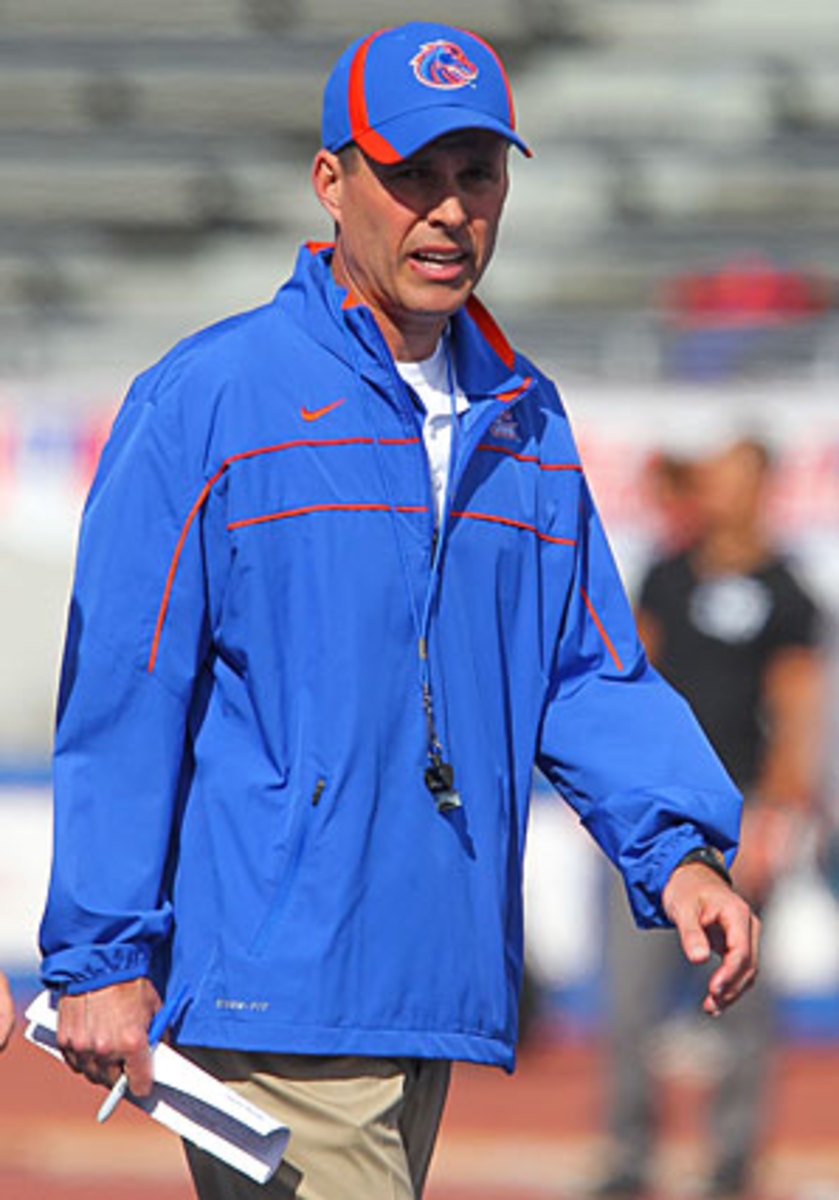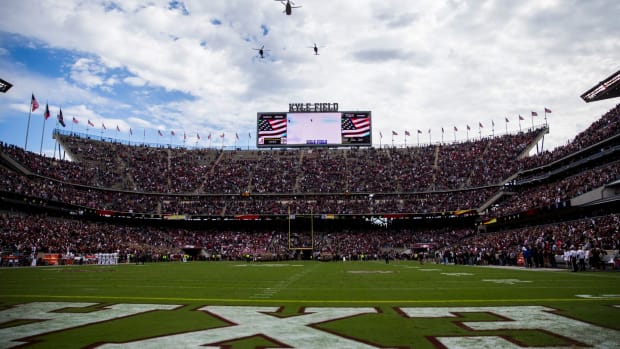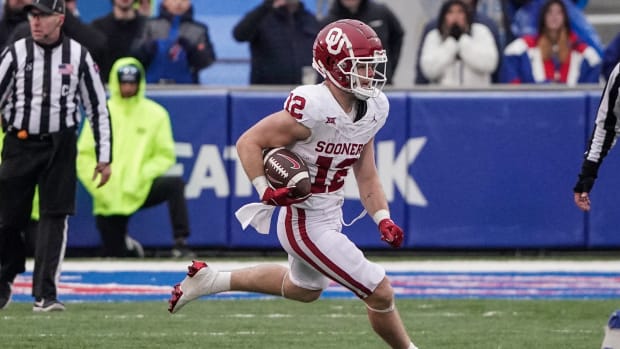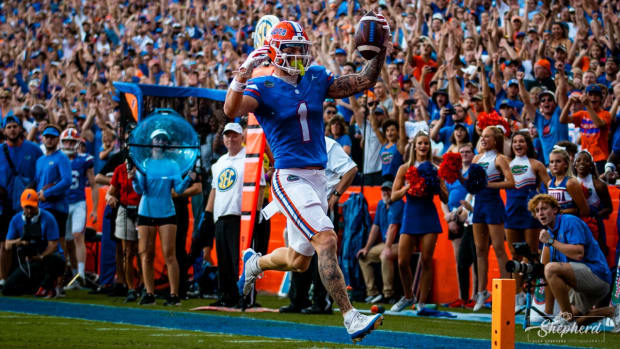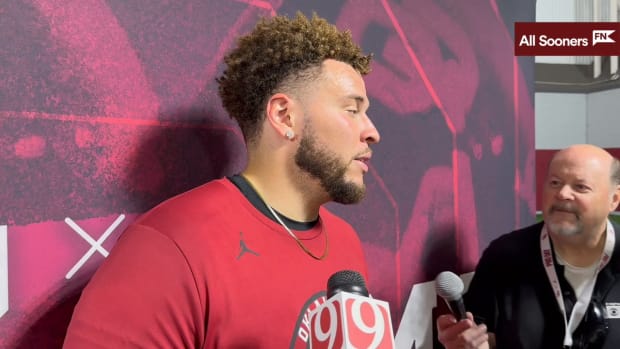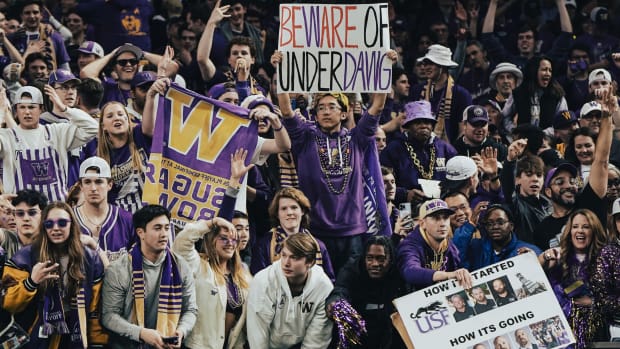Assessing Jadeveon Clowney's injury risk; more mail
OK, so an offseason College Football Mailbag is always going to face tough competition in the interest department. But that's never more the case than right now, when colossal college basketball upsets take place on a near-nightly basis and swimsuit models currently plaster the front page of SI.com. A hearty welcome to all of you who are more concerned with the latest offensive coordinator hirings (and other assorted topics).
There have been suggestions made by certain people who think Jadeveon Clowney should sit out the 2013 season to avoid any risk of injury that might hurt his NFL draft stock. Considering thatMarcus Lattimore suffered a serious knee injury in 2012, how do you feel about this idea?-- Chuck, Atlanta
I can see why the idea makes for good column fodder, both because Clowney is so ridiculously talented and because of the juxtaposition to Lattimore's injury. But beside the impracticality of the scenario (which I'll get to in a moment), I find takes like these to be incredibly cynical. They presume that a player like Clowney should view himself solely as a draft prospect and, in turn, his college career as primarily a business transaction. Maybe that's the case, but in my experience most guys play college football first and foremost because they enjoy it. They enjoy being around their teammates, they enjoy running out of the tunnel, they enjoy playing in a big conference game in front of 90,000 people and they enjoy the relatively carefree existence of being a college student. They don't see themselves as exploited laborers whose "toil next season will benefit ESPN, CBS, South Carolina and the Southeastern Conference" but not themselves.
Even if you do view the decision solely through a financial prism, it's much more likely that Clowney would hurt his draft stock by sitting out a year than that he'd help it. That certainly was the case for former Ohio State running back Maurice Clarett (who admittedly had other issues) and former USC receiver Mike Williams when they attempted that route in 2004. There is no substitute for practicing and playing live football under the guidance of well-trained coaches. If Clowney instead spent next year working with a personal trainer, he may well show up for the combine in peak physical condition, but he will have lost an entire year of skill development.
Meanwhile, what risk would he really be avoiding? Can anyone name the last consensus first-round prospect who, by playing another season of college football, suffered an injury so catastrophic that it torpedoed his NFL career? Willis McGahee blew out his knee in the national championship game and still was drafted in the first round four months later. Sam Bradford missed nearly the entire 2009 season and still went No. 1 overall. The odds are so low that Matt Barkley's family actually opted against taking out expensive disability insurance last year because it's basically throwing away money. Lattimore has obviously had terrible injury luck, but he also plays a much more injury-prone position (not to mention it was his choice to enter the draft this year, not next). And even he appears to be recovering much more quickly than originally predicted.
In sum, it's probably less risky for Clowney's future to play next season than to sit out. And it's a heck of a lot more fun. Steve Spurrier clearly agrees.
Some in the media have quickly dismissed the Paterno family's rebuttal to the Freeh Report. Of course, many of these same sportswriters have already gone on record blasting Paterno, implicitly endorsing the Freeh Report. Which report do you think more accurately represents what happened, or is the truth somewhere between? I turn to you for a thoughtful opinion.-- Mark Walker, Raleigh, N.C.
When discussing any matter in dispute, the truth probably falls somewhere in between. In this case, it's not like one report is unequivocally correct and the other unequivocally wrong. The Paternos' report raised all the same questions about the veracity of the Freeh Report that many Penn Staters have been railing about for months (most notably, Freeh's extracting a couple out-of-context e-mails to definitively conclude that Paterno knew of the 1998 criminal investigation into Jerry Sandusky). The problem is, the new report didn't really add anything of note to the record. The Paternos' investigators devoted a whole lot of pages to questioning the proof behind Freeh's version of events, but almost none to providing any proof of their own as to what might have happened instead.
I'm not sure we'll ever know exactly who knew what, or when, in regard to Sandusky's alleged '98 and 2001 incidents. But the two living people who could most help clear things up -- Tim Curley and Gary Schultz -- did not speak to either commission. When they finally testify under oath in their perjury/endangerment trials, perhaps Curley can tell us definitively who he was referring to as "Coach" in his e-mail, and perhaps Schultz can tell us why he was suspicious enough to keep a file on Sandusky but not concerned enough to report the 2001 incident to outside authorities. In the meantime, nothing about the story really changes. As David Jones of The Patriot-News wrote, it's one thing to question the NCAA's use of the Freeh Report as an excuse for Mark Emmert to subvert all previous sanctioning protocol (as I did last summer), it's another to blame it for the negative perceptions of Joe Paterno. Even if there never were a Freeh Report, much of the public would still blame Paterno for his inaction regarding Sandusky. Unfortunately for his family, that's probably never going to change, no matter how many experts they hire.
Is Dennis Erickson a good hire for Utah as its co-offensive coordinator? Does Utah have the athletes needed to compete offensively in the Pac-12?-- Kody, Layton, Utah
Erickson is an unorthodox hire, that's for sure. A 65-year-old former national championship and NFL head coach is going to serve as co-offensive coordinator with a 26-year-old former star Utah quarterback? It could work, who knows, but it seems like Kyle Whittingham has been throwing darts at the wall for three years with his offense. First he scrapped the spread and brought in Norm Chow for a year. That didn't work (Utah finished 109th nationally in total offense). Then he replaced him with then 25-year-old Brian Johnson and brought back the spread. That fared no better (Utah ranked 105th and suffered its first losing season since 2002). Now Whittingham is bringing in Erickson, noting he was one of the pioneers of the one-back offense (true) and pledging to run more hurry-up. This team changes its offensive identity more frequently than Lena Dunham unnecessarily disrobes on camera (which doesn't seem possible).
The one common thread through all the changes is that the Utes have struggled at quarterback. Things haven't been the same since Jordan Wynn first got hurt and started struggling during the 2010 campaign. Freshman Travis Wilson emerged last season and showed flashes of promise, particularly with a 311-yard game against Arizona in mid-November, but he still has a ways to go. Utah has athletes. They're certainly not of the caliber or quantity as Oregon or USC, and the receivers in particular were extremely inconsistent last year. But I don't buy that Utah can't compete athletically in the Pac-12. They already have defensively. They need a more consistent offense, and I'll be interested to find out if Erickson has the answers.
Stewart, based on your recent grades of coaching hires, it seems like the SEC West will be loaded with quality head coaches next year. It's adding Bret Bielema and Gus Malzahn to Nick Saban, Les Miles, Kevin Sumlin, etc. Have you ever seen a division with such a high level of head coaching from top to bottom? Also, do you expect it to be challenging for the coaches to stay where they are given the sheer difficulty of constantly winning games in the SEC West?-- Ted, Oakland, Calif.
It's like I said last week after the recruiting rankings were finalized: It may be a feather in the cap of the SEC that 11 teams ranked among Rivals' Top 25 classes, but it's going to be a nightmare for whichever coach finishes 11th with that kind of talent. You went 5-7 with a bunch of four-star recruits? See ya.
I think it's safe to say that there have never been so many renowned coaches in one division. You could look back to the early 2000s when Bob Stoops, Mack Brown, Miles and Mike Leach all coached in the Big 12 South, but that's only four guys. One of the SEC coaches listed above is guaranteed to finish fifth, or worse, every year. Bielema (Arkansas) and Malzahn (Auburn) can get away with that for a season, but not much longer. For any of the others, such a low finish will be considered a complete disaster. Throw in Dan Mullen, who not long ago was one of the hottest coaches in the league, and Hugh Freeze, who will now be expected to produce after signing a top-10 class, and somebody with a big salary and lofty expectations has to finish seventh. Unless the teams break into perfect parity and rotate turns at the top, middle and bottom, here's guessing two to three of those coaches will be gone within two to three years -- whether of their own volition or someone else's.
Another year goes by and Chris Petersen is still at Boise. At this point can we pencil him in for staying with the Broncos for the next 10 years?-- Daniel, Washington, D.C.
There will always be speculation about Petersen as long as Boise remains outside the power-conference structure, but those rumors should begin to dissipate at this point. For one thing, the one job he was long believed to covet, Oregon, just hired somebody else (Mark Helfrich) who could well hold down the position for the next 10 years. Meanwhile, though it's still not in the Big 12 or Pac-12, Boise is now rejoining a Mountain West that may be at its strongest point in league history, adding two 11-win teams from last season (San Jose State and Utah State) and a conference championship game. It also gets a sweetheart deal that excludes Broncos' home games from the conference television package (the league and school can sell those to the highest bidder), ensuring the school a bigger share than before if it can reach a BCS game and financial bonuses for national TV appearances (of which Boise figures to have by far the most in the league).
Simply put, there's far less reason for Petersen to leave in 2013 than there was in any year since he's been there. But don't pencil in anything for 10 years in this sport. The Big East may have expanded to Mars by that point.
Now that this signing season is over, we can look to next year -- and we're staring straight into the belly of the beast. My imagination is running amok with ideas of how incessantly coaches will hound prospects under the new recruiting rules. But the rules are the rules. Which conferences and coaches will rise to the occasion or drop down to the lowest common denominator by spending every minute of every day pestering high school athletes? Two words jump out to me: Lane Kiffin.-- Giles, Denver
Kiffin is a pretty aggressive recruiter, so that's not a bad guess. But is it really immoral or unethical to flood a recruit with texts and messages? I don't think it's that simple. While many coaches (Urban Meyer, David Shaw) have been outspoken in their criticism of the NCAA's deregulation, others have contended that the market will regulate itself. Certain kids will be effectively swayed by persistent contact, and in those cases, coaches will have to work accordingly. But others may just as easily be turned off by it, and coaches will need to be sensitive to that, too. Remember, coaches already enjoy virtually unlimited contact via Facebook and Twitter messaging. I've even heard of youngish assistants that get around the limits by playing Xbox online with the kids (where you can speak through the headsets). Some of this concern for recruits' welfare may be a bit disingenuous; it's more that the coaches want the NCAA to mandate breaks for them.
Still, I don't blame the Big Ten for asking the NCAA this week to put the implementation of some rules on hold. I'm not sure leaders realize just what a wormhole they opened. At a time when many athletic departments are facing deficits and some forced to cut sports, there is going to be so much money wasted in the coming years on hiring more recruiters (since they're no longer limited), producing more recruiting materials (Fatheads, Fatheads, Fatheads) and traveling to visit already-committed recruits (because there are no longer limits on how many assistants can travel at once). It would be great to provide some relief for recruits while they're at it, but I doubt that's the primary cause of concern.
While Frank Beamer has done more with less at Virginia Tech than Nick Saban at Alabama or Urban Meyer at Florida or Ohio State, it seems like he'll get no respect until he wins a national championship. Is it tougher to win a national championship at a school with a great history and a great recruiting footprint, or is it more difficult to build a program that has very little history up from nothing, even if you don't win the national title?-- Rob, Richmond, Va.
I've discussed this topic in very similar fashion with Bill Snyder, arguing that what he's accomplished at Kansas State ranks among the all-time great coaching careers regardless of whether the Wildcats ever climb that last elusive hurdle and play for the national title. You can probably say many of the same things about Beamer. It's incredibly difficult to reach 20 straight bowl games at any school, but certainly more so at Virginia Tech than Alabama or Florida. It's a testament to what he built that last year's 7-6 season was considered so abnormal following eight straight double-digit win seasons; in fact, neither Alabama nor Florida has ever produced an equivalent streak. So while Beamer no longer rates among the "hot" coaches of the day, there's absolutely no question he's had a Hall of Fame career.
That said, national championships will always be the defining measure of coaching greatness. That's what everybody plays for, and the guys who win titles -- especially multiple times -- will always be viewed more favorably. They're hard to capture, even at Alabama or Florida. Ask Mike Shula or Ron Zook. And what Saban is doing right now -- building a program that contends annually for the crystal football -- requires every bit the effort, if not more, as it does to carry a program up from the bottom.
But you can also win a national championship without an accompanying legacy. Would anyone reasonably suggest Gene Chizik was a better coach than Frank Beamer? Larry Coker? Heck, Dennis Erickson (who has two)? I doubt it. History will ultimately view Beamer very favorably, but it's hard to imagine he'll be celebrated as much as coaches who consistently dominate and win trophies at blueblood programs.
Stewart, at what point does SEC dominance equate to poor ratings and attendance for college football in other parts of the country?-- Peter Gerski, New Berlin, Wis.
Good question. Attendance was down throughout college football last season, SEC included, so you can't go there just yet.
Meanwhile, the number of Mailbag submissions has reached its lowest level since ... well, two weeks ago. Can I blame that on SEC dominance? Or did I get what was coming by oversigning (the number of offseason editions)?
